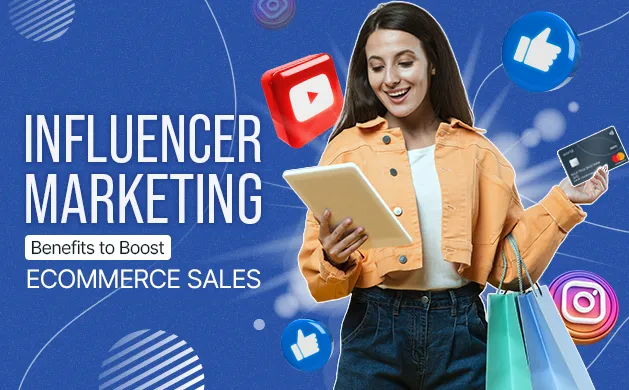Imagine, discovering a new product because someone you trust recommended it and it soon became your favourite. Now, let’s revive a bit and look at how the brand with an influencer caught your attention. You are browsing through Instagram one day, and you come across your favourite fashion influencer, say, Kritika Khurana, endorsing a new clothing brand. She also provides a discount code, models how the items would fit, and gives reasons why she prefers the brand’s products. To your surprise, you follow the link to their website and all of a sudden, you find yourself loading your shopping cart with products that you cannot even begin to wait to get your hands on.
Till date, influencer marketing for e-commerce has the potential to enthral audiences and turn casual browsers into loyal customers, and create buoyant sales and customer engagement.
According to Hubspot, 92% of marketers believe influencer marketing in India is effective, with businesses making $5.20 for every $1 spent. On top of that, 69% of consumers state that they trust the recommendations that influencers give them for new products or services. From this, we can deduce that influencer marketing in the ecommerce industry is a highly trusted and financially rewarding method.
Now, we have established that, let’s go now to understand why influencer marketing is significant for e-commerce brands.
Importance of Influencer Marketing for Ecommerce Business
We have already realised that social media marketing is now in full swing since 93% of the population is using social networks. Let alone, India has the highest number of users on Instagram in the whole wide world, with over 358 million users! This makes it an ideal goldmine for e-commerce businesses that seek to capitalise on the large Indian market.
However, to do so, social proof is the key to building trust and enhancing brand recognition for the growth of the e-commerce business by leveraging influencers. When influencers- the trusted voices endorse products or services, their followers perceive them positively, creating credibility and authenticity.
Beyond trust-building, influencer collaborations build customer loyalty by showcasing real-life product experiences. Influencer marketing for e-commerce brands can strategically help achieve business goals, from acquiring new customers and optimizing user experiences to diversifying product offerings.
Now, let’s look at some of the many benefits of e-commerce influencer marketing campaigns.
Benefits of Influencer Marketing for E-commerce Sales Growth
1. New Market Segments
Influencer marketing for e-commerce brands help in penetrating new audiences and markets. It allows them to partner with influencers having a varied and large follower base to reach out extensively into new demographic segments.
2. Educate Buyers About Your Product
To potential buyers, ecommerce influencer marketing can be useful in having more insights regarding your products considering your brand’s offerings. Influencers can be artistic enough to display how it is used and explain the characteristics and advantages that are unique in it. Due to the integration of your products into their everyday lives, they enable people to understand, in relatively few words, why they should buy your products by providing actual examples.
3. Precision Targeting
Influencers have a pre-built specific audience aligned with their niche. This is a huge win when working with influencers whose audience consists mostly of the target demographics of an e-commerce business. The interests and preferences of the target audience and the influencer’s followers are one and the same.
4. Boost Brand Authority
Another influencer marketing benefit for ecommerce is its ability to increase a brand’s weight, as in its authority. The audiences begin to see your brand as credible and worthy of patronage when respected influencers vouch for your product or service. Approval from these influencers gives a higher value to your brand and approved status. This association with trusted voices enhances your brand's image and also positions you as a leader in your industry, making potential customers more confident in choosing your products.
5. Get Better Quality Leads and Increase Sales
Now, influencer marketing in ecommerce industry isn’t only about brand visibility, at the end, brands want leads and sales. When influencers with dedicated and engaged followings recommend your products, their audience pays attention. These followers trust the influencer's opinion, making them more likely to be genuinely interested in your offerings. This trust translates into better quality leads who are already inclined to purchase.
Having understood this specific marketing segment and the advantages of influencer marketing for e-commerce businesses, let’s now turn our attention to an e-commerce influencer marketing campaign in action.
A Successful E-commerce Influencer Marketing Campaign
Meesho X Grynow
Meesho, an e-commerce shopping platform, partnered with Grynow, the top influencer marketing agency in India, to obtain brand visibility and spread awareness.
Objective: The primary objective of the campaign was to increase the visibility of the e-commerce platform, the target being on the Meesho Fashion category.
Strategy: The agency aimed to target shopaholics through tailored campaigns, resonating with Meesho’s proposition in a unique way. They instructed influencers to make videos on concepts like Haul, Review and Vlog videos to establish authentic and credible brand messages.
Influencers: They collaborate with more than 50 Micro and Mid-tier YouTubers, focusing on the Beauty, Fashion, and Lifestyle genres.
Results: More than 50+ videos were involved in the 4-month campaign, and more than 1 million views were achieved.
Wrapping Up
As we reach our conclusion, one fundamental thing we have established is that influencer marketing for e-commerce business is probably the most lucrative form of marketing in this digital landscape. With a well-thought-out strategy and an ideal ecommerce influencer marketing agency for your campaign, your brand will receive palpable ROI.
